Unit 6 TV programmes Integrated skills 课件 (共25张PPT,内嵌音频) 牛津译林版九年级英语上册
文档属性
| 名称 | Unit 6 TV programmes Integrated skills 课件 (共25张PPT,内嵌音频) 牛津译林版九年级英语上册 |

|
|
| 格式 | pptx | ||
| 文件大小 | 7.3MB | ||
| 资源类型 | 教案 | ||
| 版本资源 | 牛津译林版 | ||
| 科目 | 英语 | ||
| 更新时间 | 2025-02-03 00:00:00 | ||
图片预览

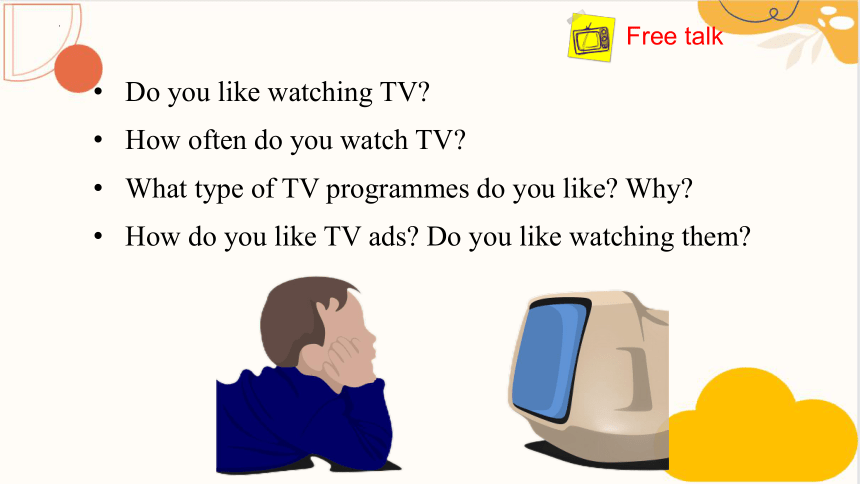
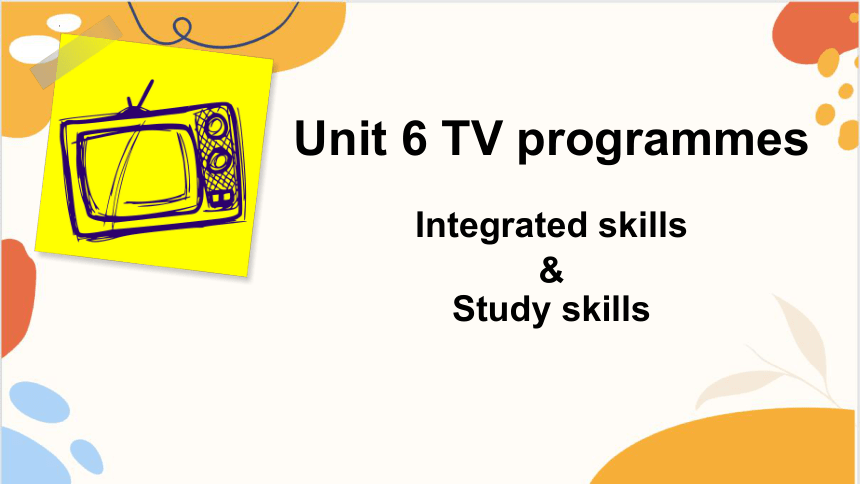
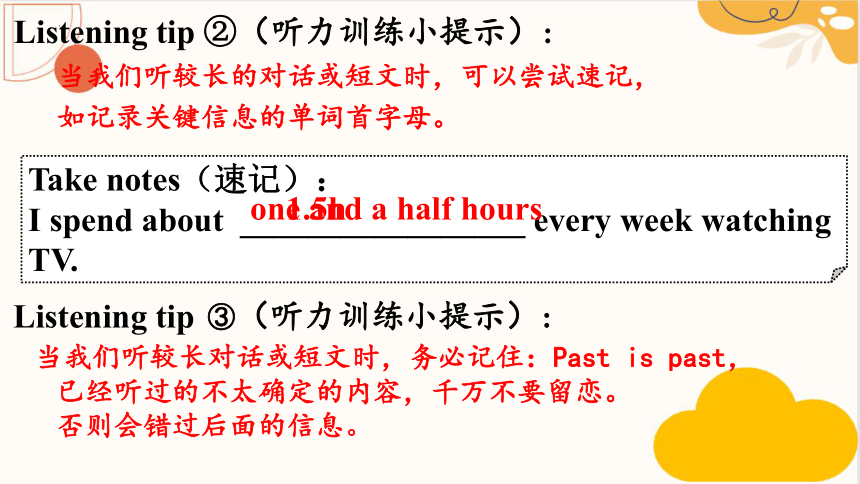

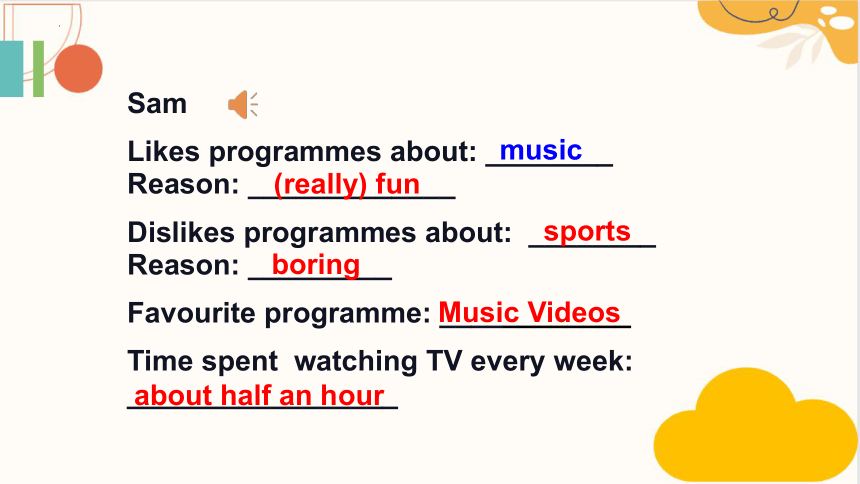
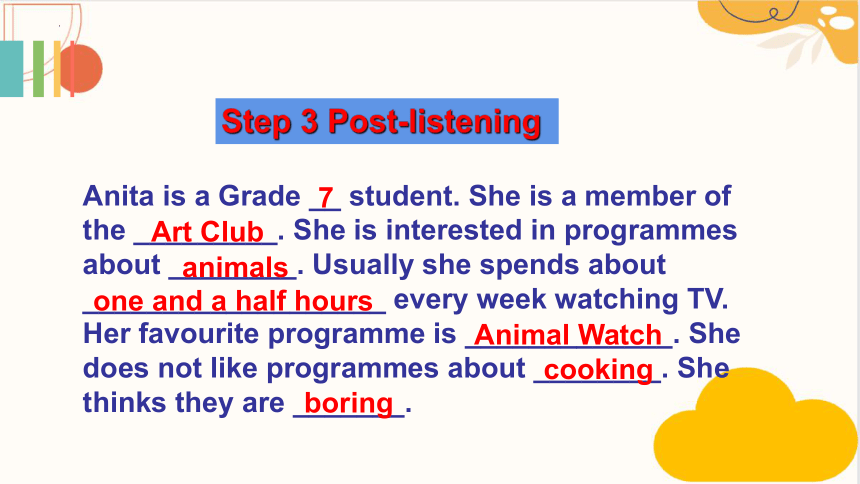
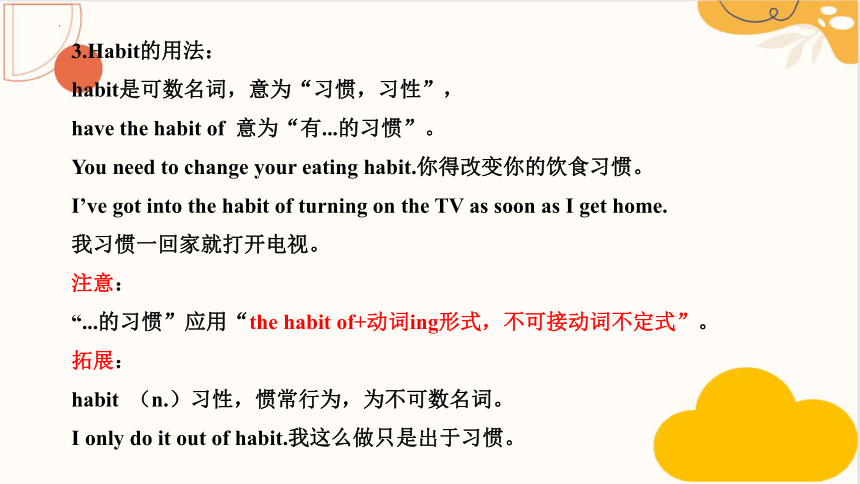
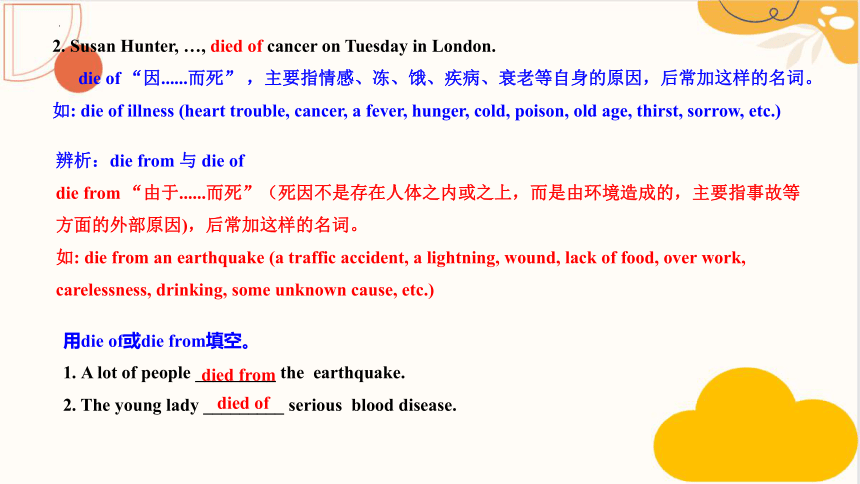
文档简介
(共25张PPT)
牛津译林版九年级英语上册
Unit 6 TV programmes Integrated skills
Do you like watching TV
How often do you watch TV
What type of TV programmes do you like Why
How do you like TV ads Do you like watching them
Free talk
Unit 6 TV programmes
Integrated skills
&
Study skills
Take notes(速记):
I spend about _________________ every week watching TV.
one and a half hours
1.5h
Listening tip ②(听力训练小提示):
当我们听较长的对话或短文时,可以尝试速记,
如记录关键信息的单词首字母。
Listening tip (听力训练小提示):
当我们听较长对话或短文时,务必记住:Past is past,
已经听过的不太确定的内容,千万不要留恋。
否则会错过后面的信息。
③
Anita
Likes programmes about: ___________ Reason: _______________
Dislikes programmes about: _________ Reason: ______________
Favourite programme: __________________________
Time spent watching TV every week: ___________________________
animals
(very) interesting
cooking
boring
Animal Watch
about one and a half hours
While-listening:P87 A2
Sam
Likes programmes about: ________ Reason: _____________
Dislikes programmes about: ________ Reason: _________
Favourite programme: ____________
Time spent watching TV every week: _________________
music
(really) fun
sports
boring
Music Videos
about half an hour
Anita is a Grade __ student. She is a member of the _________. She is interested in programmes about ________. Usually she spends about ___________________ every week watching TV. Her favourite programme is _____________. She does not like programmes about ________. She thinks they are _______.
Step 3 Post-listening
7
Art Club
animals
Animal Watch
boring
one and a half hours
cooking
3.Habit的用法:
habit是可数名词,意为“习惯,习性”,
have the habit of 意为“有...的习惯”。
You need to change your eating habit.你得改变你的饮食习惯。
I’ve got into the habit of turning on the TV as soon as I get home.
我习惯一回家就打开电视。
注意:
“...的习惯”应用“the habit of+动词ing形式,不可接动词不定式”。
拓展:
habit (n.)习性,惯常行为,为不可数名词。
I only do it out of habit.我这么做只是出于习惯。
2. Susan Hunter, …, died of cancer on Tuesday in London.
die of “因......而死” ,主要指情感、冻、饿、疾病、衰老等自身的原因,后常加这样的名词。
如: die of illness (heart trouble, cancer, a fever, hunger, cold, poison, old age, thirst, sorrow, etc.)
辨析:die from 与 die of
die from “由于......而死”(死因不是存在人体之内或之上,而是由环境造成的,主要指事故等方面的外部原因),后常加这样的名词。
如: die from an earthquake (a traffic accident, a lightning, wound, lack of food, over work, carelessness, drinking, some unknown cause, etc.)
用die of或die from填空。
1. A lot of people _________ the earthquake.
2. The young lady _________ serious blood disease.
died from
died of
Likes programmes about:(1)_____ Reason:(2) ________
Dislikes programmes about:(3)_______Reason:(4) _____
Favourite programme: (5) __________________
Time spent watching TV every week:(6)_____________
_____________
Anita
animals
interesting
cooking
boring
Animal Watch
about one and a half hours
A2: Listen and complete the notes.
Name Grade What I know about him/her Favourite TV programme
Anita 7 Art club loves playing with her cat at home
Philip 8 Football team a very good football player
Sam 9 Drama club likes acting
animals
sports
drama/music
A1: Read and predict
Philip
Likes programmes about: _________
Reason: ____________
Dislikes programmes about: _________ Reason: ____________________
Favourite programme: _______________________
Time spent watching TV every week: _______________________
sports
(very) exciting
animals
not (very) interesting
Sports World
about an hour
Sam
Likes programmes about: ___________ Reason: _______________
Dislikes programmes about: _________ Reason: ____________
Favourite programme: __________________
Time spent watching TV every week: ______________________
music
(really) fun
sports
boring
Music Videos
about half an hour
Likes programmes about:(1)_____ Reason:(2) ________
Dislikes programmes about:(3)_______Reason:(4) _____
Favourite programme: (5) __________________
Time spent watching TV every week:(6)_____________
sports
Philip
exciting
animals
not interesting
Sports World
about an hour
Post-listening:Finish the report A3
TV viewing habits
I have interviewed three students at my school about their TV viewing habits. I found that they are different from each other.
Philip is a Grade __ student. He is a very good ______________, so he likes programmes about ________. He thinks they are very __________. His favourite TV programme is ______________. He spends about ________ every week watching TV. He does not like watching programmes about ________ — he does not find them very ___________.
8
football player
sports
exciting
Sports World
animals
an hour
interesting
Sam is a Grade __ student. He is a member of the ___________. He likes ______ programmes, because he thinks they are really _____. His favourite programme is ____________. He watches TV for about ____________ every week. He finds programmes about __________ boring.
9
Drama Club
music
fun
Music Video
sports
half an hour
4. silly的用法:
Silly 是形容词,意为“傻的,愚蠢的。糊涂的”,其反义词是clever/bright/wise.
He’s so silly. 他太傻了。
注意: Silly 的比较级是sillier, 最高级是silliest.
辨析:silly/foolish/stupid
silly 意为“傻的”,用于修饰人时,一般指头脑简单、不懂事;常用于修饰言行,一般指“无聊的”。
foolish 意为“愚蠢的”,用于修饰人时,着重指无头脑,缺乏智慧或判断力;用于修饰行为时,指愚蠢或考虑不周的举动。
stupid 意为“笨的”,用于修饰人或事时,着重指生性迟钝或反应迟钝,有时是中性词。
5. waste的用法:
Waste是名词,意为“浪费”,常构成短语:
a waste of 浪费.. ; waste (vt.)浪费; 反义词为:save 节约
It’s a waste of time to wait any longer. 再等下去就是浪费时间。
Don’t waste water. 不要浪费水。
拓展:
Waste(adj.)无用的,多余的 Wasteful(adj.)浪费的,挥霍的
Waste(n.)废料,垃圾,污水
固定搭配:
Waste one’s time/money/energy on(doing)sth
浪费某人的时间/金钱/精力在(做)某事上
Waste away 消瘦
6. hundreds of的用法(高频考点)
Hundred of 意为“成百上千的,数以百计的”。
当hundred与介词of连用时,须用复数形式,且前面不可用数词来修饰,此时只表示一个不确切的数量。
We learned hundreds of English words last term. 上学期我们学了数百个英语单词。
拓展:
(1)hundred与具体数字连用时,不可用复数形式,但其后面的名词用复数形式。
There are about six hundred students in our school.
我们学校大约有600名学生。
(2)thousand,million,billion的用法与hundred相同。
Thousand of成千上万的;
millions of数以百万计的,许许多多的,
billions of数十亿的
7. mostly的用法(高频考点)
Mostly是副词,意为“主要地,一般地,通常”
We are mostly out on Sundays. 我们星期天一般不在家。
辨析:most/mostly/the most
most 做形容词,意为“多数的,大部分的”,most前不可加定冠词 the;most做副词,意为“非常”,常修饰kind,helpful,grateful,beautiful等表示主观感受的形容词或副词,不能与the连用,只能用于肯定句中。
Most people think the boy is lying. 大多数的人认为这个男孩在撒谎。
It’s most kind of you to meet me. 你来接我真是太好了。
mostly 做副词,意为“主要地,一般,多半”等。
These stories are mostly funny. 这些故事大部分是有趣的。
the most 意为“最大数量,最大程度”at(the)most意为“至多,不超过,”可用very 加强语气。
This is the most I can do. 这是我力所能及的。
There are 100 people here,at the very most.这儿至多有100人。
1. A cat show _______ in Shanghai last month.
A was happened B. was held
C. was taken place D. have taken place
2. A popular poet ______ cancer on Tuesday in London. She was 73.
A died off B. died of
C. died down D. died out
3. Alice is the girl _______ invention got the first prize in the school competition.
A who B. that C. which D. whose
4. None of them knew what had happened _______ they watched the news on the Internet.
A though B. when C. until D. after
Exercises
1. Both newspapers and websites provide the ________ (late) news.
2. Lei Feng was famous for __________ (help) others without any complains.
3. Children around the country grew up __________ (watch) her programmes on TV.
4. You will become interested in art unless you have little ________ (interesting) in it.
5. Before reading the book, you should read the __________ (introduce) carefully.
6. Have you interviewed ten students at your school about their TV _________ (view) habits
latest
helping
watching
interest
introduction
viewing
仓颉之初作书盖依类象形故谓之文其形声相益即谓之字文者物象之本字者言孳乳而浸多也著于竹帛谓之仓颉之初作书盖依类象形故谓之文其形声相益即谓之字文者物象之本字者言孳乳而
谢君一赏
Homework
1.Note down the useful expressions on Page 87-88
2.Write down your TV viewing habits in your notebooks
3.Complete the exercises in the exercise books.
牛津译林版九年级英语上册
Unit 6 TV programmes Integrated skills
Do you like watching TV
How often do you watch TV
What type of TV programmes do you like Why
How do you like TV ads Do you like watching them
Free talk
Unit 6 TV programmes
Integrated skills
&
Study skills
Take notes(速记):
I spend about _________________ every week watching TV.
one and a half hours
1.5h
Listening tip ②(听力训练小提示):
当我们听较长的对话或短文时,可以尝试速记,
如记录关键信息的单词首字母。
Listening tip (听力训练小提示):
当我们听较长对话或短文时,务必记住:Past is past,
已经听过的不太确定的内容,千万不要留恋。
否则会错过后面的信息。
③
Anita
Likes programmes about: ___________ Reason: _______________
Dislikes programmes about: _________ Reason: ______________
Favourite programme: __________________________
Time spent watching TV every week: ___________________________
animals
(very) interesting
cooking
boring
Animal Watch
about one and a half hours
While-listening:P87 A2
Sam
Likes programmes about: ________ Reason: _____________
Dislikes programmes about: ________ Reason: _________
Favourite programme: ____________
Time spent watching TV every week: _________________
music
(really) fun
sports
boring
Music Videos
about half an hour
Anita is a Grade __ student. She is a member of the _________. She is interested in programmes about ________. Usually she spends about ___________________ every week watching TV. Her favourite programme is _____________. She does not like programmes about ________. She thinks they are _______.
Step 3 Post-listening
7
Art Club
animals
Animal Watch
boring
one and a half hours
cooking
3.Habit的用法:
habit是可数名词,意为“习惯,习性”,
have the habit of 意为“有...的习惯”。
You need to change your eating habit.你得改变你的饮食习惯。
I’ve got into the habit of turning on the TV as soon as I get home.
我习惯一回家就打开电视。
注意:
“...的习惯”应用“the habit of+动词ing形式,不可接动词不定式”。
拓展:
habit (n.)习性,惯常行为,为不可数名词。
I only do it out of habit.我这么做只是出于习惯。
2. Susan Hunter, …, died of cancer on Tuesday in London.
die of “因......而死” ,主要指情感、冻、饿、疾病、衰老等自身的原因,后常加这样的名词。
如: die of illness (heart trouble, cancer, a fever, hunger, cold, poison, old age, thirst, sorrow, etc.)
辨析:die from 与 die of
die from “由于......而死”(死因不是存在人体之内或之上,而是由环境造成的,主要指事故等方面的外部原因),后常加这样的名词。
如: die from an earthquake (a traffic accident, a lightning, wound, lack of food, over work, carelessness, drinking, some unknown cause, etc.)
用die of或die from填空。
1. A lot of people _________ the earthquake.
2. The young lady _________ serious blood disease.
died from
died of
Likes programmes about:(1)_____ Reason:(2) ________
Dislikes programmes about:(3)_______Reason:(4) _____
Favourite programme: (5) __________________
Time spent watching TV every week:(6)_____________
_____________
Anita
animals
interesting
cooking
boring
Animal Watch
about one and a half hours
A2: Listen and complete the notes.
Name Grade What I know about him/her Favourite TV programme
Anita 7 Art club loves playing with her cat at home
Philip 8 Football team a very good football player
Sam 9 Drama club likes acting
animals
sports
drama/music
A1: Read and predict
Philip
Likes programmes about: _________
Reason: ____________
Dislikes programmes about: _________ Reason: ____________________
Favourite programme: _______________________
Time spent watching TV every week: _______________________
sports
(very) exciting
animals
not (very) interesting
Sports World
about an hour
Sam
Likes programmes about: ___________ Reason: _______________
Dislikes programmes about: _________ Reason: ____________
Favourite programme: __________________
Time spent watching TV every week: ______________________
music
(really) fun
sports
boring
Music Videos
about half an hour
Likes programmes about:(1)_____ Reason:(2) ________
Dislikes programmes about:(3)_______Reason:(4) _____
Favourite programme: (5) __________________
Time spent watching TV every week:(6)_____________
sports
Philip
exciting
animals
not interesting
Sports World
about an hour
Post-listening:Finish the report A3
TV viewing habits
I have interviewed three students at my school about their TV viewing habits. I found that they are different from each other.
Philip is a Grade __ student. He is a very good ______________, so he likes programmes about ________. He thinks they are very __________. His favourite TV programme is ______________. He spends about ________ every week watching TV. He does not like watching programmes about ________ — he does not find them very ___________.
8
football player
sports
exciting
Sports World
animals
an hour
interesting
Sam is a Grade __ student. He is a member of the ___________. He likes ______ programmes, because he thinks they are really _____. His favourite programme is ____________. He watches TV for about ____________ every week. He finds programmes about __________ boring.
9
Drama Club
music
fun
Music Video
sports
half an hour
4. silly的用法:
Silly 是形容词,意为“傻的,愚蠢的。糊涂的”,其反义词是clever/bright/wise.
He’s so silly. 他太傻了。
注意: Silly 的比较级是sillier, 最高级是silliest.
辨析:silly/foolish/stupid
silly 意为“傻的”,用于修饰人时,一般指头脑简单、不懂事;常用于修饰言行,一般指“无聊的”。
foolish 意为“愚蠢的”,用于修饰人时,着重指无头脑,缺乏智慧或判断力;用于修饰行为时,指愚蠢或考虑不周的举动。
stupid 意为“笨的”,用于修饰人或事时,着重指生性迟钝或反应迟钝,有时是中性词。
5. waste的用法:
Waste是名词,意为“浪费”,常构成短语:
a waste of 浪费.. ; waste (vt.)浪费; 反义词为:save 节约
It’s a waste of time to wait any longer. 再等下去就是浪费时间。
Don’t waste water. 不要浪费水。
拓展:
Waste(adj.)无用的,多余的 Wasteful(adj.)浪费的,挥霍的
Waste(n.)废料,垃圾,污水
固定搭配:
Waste one’s time/money/energy on(doing)sth
浪费某人的时间/金钱/精力在(做)某事上
Waste away 消瘦
6. hundreds of的用法(高频考点)
Hundred of 意为“成百上千的,数以百计的”。
当hundred与介词of连用时,须用复数形式,且前面不可用数词来修饰,此时只表示一个不确切的数量。
We learned hundreds of English words last term. 上学期我们学了数百个英语单词。
拓展:
(1)hundred与具体数字连用时,不可用复数形式,但其后面的名词用复数形式。
There are about six hundred students in our school.
我们学校大约有600名学生。
(2)thousand,million,billion的用法与hundred相同。
Thousand of成千上万的;
millions of数以百万计的,许许多多的,
billions of数十亿的
7. mostly的用法(高频考点)
Mostly是副词,意为“主要地,一般地,通常”
We are mostly out on Sundays. 我们星期天一般不在家。
辨析:most/mostly/the most
most 做形容词,意为“多数的,大部分的”,most前不可加定冠词 the;most做副词,意为“非常”,常修饰kind,helpful,grateful,beautiful等表示主观感受的形容词或副词,不能与the连用,只能用于肯定句中。
Most people think the boy is lying. 大多数的人认为这个男孩在撒谎。
It’s most kind of you to meet me. 你来接我真是太好了。
mostly 做副词,意为“主要地,一般,多半”等。
These stories are mostly funny. 这些故事大部分是有趣的。
the most 意为“最大数量,最大程度”at(the)most意为“至多,不超过,”可用very 加强语气。
This is the most I can do. 这是我力所能及的。
There are 100 people here,at the very most.这儿至多有100人。
1. A cat show _______ in Shanghai last month.
A was happened B. was held
C. was taken place D. have taken place
2. A popular poet ______ cancer on Tuesday in London. She was 73.
A died off B. died of
C. died down D. died out
3. Alice is the girl _______ invention got the first prize in the school competition.
A who B. that C. which D. whose
4. None of them knew what had happened _______ they watched the news on the Internet.
A though B. when C. until D. after
Exercises
1. Both newspapers and websites provide the ________ (late) news.
2. Lei Feng was famous for __________ (help) others without any complains.
3. Children around the country grew up __________ (watch) her programmes on TV.
4. You will become interested in art unless you have little ________ (interesting) in it.
5. Before reading the book, you should read the __________ (introduce) carefully.
6. Have you interviewed ten students at your school about their TV _________ (view) habits
latest
helping
watching
interest
introduction
viewing
仓颉之初作书盖依类象形故谓之文其形声相益即谓之字文者物象之本字者言孳乳而浸多也著于竹帛谓之仓颉之初作书盖依类象形故谓之文其形声相益即谓之字文者物象之本字者言孳乳而
谢君一赏
Homework
1.Note down the useful expressions on Page 87-88
2.Write down your TV viewing habits in your notebooks
3.Complete the exercises in the exercise books.
